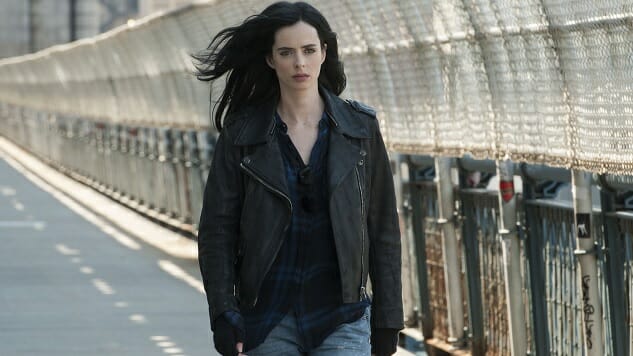
Is this whole virus/vaccine plot device played out? Does boiling down a character’s super powers to nothing more than an airborne infectious agent rob them both of their dramatic oomph? Back in the day, Blade (incidentally the Marvel film that laid out the groundwork for the rise of comic book films through the aughts and up to today) revised vampirism from a supernatural affliction to something of a terminal illness or an STD. That little tweak actually wound up working in Blade’s favor: demystifying an ages-old folkloric trope made that trope feel fresh and helped build the film’s universe without taking away from the macabre appeal of vampires. It’s a prime example of having your cake and eating it.
Making Kilgrave the sad result of a Frankenstein’s monster scenario does the same thing for Jessica Jones. “Sin Bin” humanizes our villain by introducing us to his parents, who put him through the scientific wringer to save his life, with unintended consequences. Funny, though, that “humanize” has such a broad meaning. Kilgrave is a monster, and he acts out on monstrous whims, but those negative qualities—his self-denial of accountability and his entitlement—are precisely what make him human, and his repugnant humanity is precisely what makes him a compelling antagonist to Jessica. Imagine a version of Kilgrave who owns up to all of the terrible things he does, while laughing maniacally in the name of cartoonish evil. That guy, he’s boring and one-dimensional. Kilgrave, by contrast, isn’t.
Basically, he’s the heavy Jessica Jones deserves. “AKA 1,000 Cuts” continues to escalate his crimes in bold, bloody ways: the title refers to the culmination of Jeri’s divorce plot, in which Wendy slashes Jeri to ribbons by Kilgrave’s command. There’s a very literal vulgarity to the way that Kilgrave employs his abilities, perhaps best seen by the start of the episode, where we see Trish continue her exhaustive efforts to put a bullet into her head by shoving a casing against her temple. This is Preacher-level stuff; in that comic series, Reverend Jesse Custer possesses the word of God, which enables him to make anyone do anything. In one arc, he tells a group of racist rednecks to “burn,” and they each burst into flames. That’s about where Kilgrave is on the brainwashing scale, though mercifully he has yet to try such roundly poetic applications of his “gift.”
Mostly, he uses it to create “damned if you do, damned if you don’t” situations to torment Jessica, as in the episode’s climax. But “AKA 1,000 Cuts” takes time to demonstrate how the people in Jessica Jones blithely orchestrate their own suffering. Kilgrave doesn’t, for example, influence Malcolm’s support group to go a-hunting for Jessica as they eventually do. That happens at the urging of Robyn, still understandably grief struck over the loss of Ruben, but Kilgrave is all too happy to take advantage of their witch hunt to achieve his own ends. And Jeri is the guilty party in her ugly divorce with Wendy. Not only is she the unfaithful spouse, she’s also intractable in their divorce proceedings. Would Wendy have made it through “AKA 1,000 Cuts” in another timeline, where she and Jeri split amicably? Maybe, maybe not, and in fairness to Jeri, it’s not her fault that Kilgrave orders Wendy to slash at her with a knife. It is, however, partly her fault that Kilgrave is able to escape at all, and it is by her actions that Wendy feels such acrimony for her.
How about Simpson? First, let’s be realistic: there’s probably no good dramatic reason for him to take a heel turn and kill Clemons. This is the only major stumble Jessica Jones has made, which isn’t to say that, as stumbles go, it’s especially bad—it just isn’t necessary. It does speak to the show’s rape narrative, however. Here, Simpson is the misguided male ally who makes Jessica and Trish’s respective traumas all about him. He means well. He does! But he’s so single-minded in his mission to avenge them and take out Kilgrave that he totally erases the women from the equation. It’s telling that Kilgrave doesn’t need to get to Simpson for Simpson to become an obstacle for Jessica. He only needed to interact with him once, many episodes ago, to plant the seed for this to happen.
?And that’s true of the final moments in “AKA 1,000 Cuts,” too. Hope’s suicide, at once brave and needless, is written into the story at the end of “AKA Ladies Night,” though we certainly believed that Jessica would get her out of hot water before the series’ finale. At least now there’s nothing stopping Jessica from killing Kilgrave, but this isn’t the outcome anybody wanted, Jessica most of all. For Hope, it’s a release. For Jessica, it’s a mark of failure. For viewers, it’s another way that Jessica Jones breaks the Marvel mold and sets itself apart from the brand.
Boston-based critic Andy Crump has been writing online about film since 2009, and has contributed to Paste Magazine since 2013. He also writes for Screen Rant, Movie Mezzanine, and Birth.Movies.Death. You can follow him on Twitter. He is composed of roughly 65% craft beer.